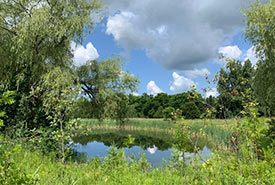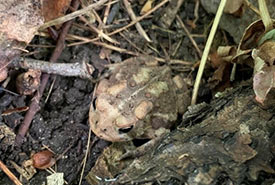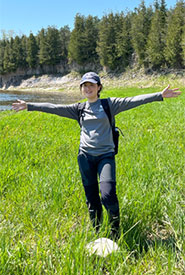What five months in a cabin taught me about conservation

The view of the southern pond at Graham property (Photo by Alice Xiao/NCC staff)
I always wanted to live in a cabin in the woods, to be away from the city and experience life in the countryside. I imagined it to be like in the picture books of woodland animals: baking, sewing and drinking tea in cozy wood cabins, all with a fireplace glowing warmly behind them. Having lived most of my life in big cities, moving to the Nature Conservancy of Canada’s (NCC’s) Graham cabin was a welcome change for a recent graduate from an urban university. Prepped with health and safety training for the job, I was eager to start a career in conservation. The cabin sits deep within the Graham property, one of NCC’s properties in the Maitland River Valley.
In my first month of my internship with NCC, everything was new and exciting. I was entranced by the variety of birds, insects and plants found on the property. Whenever I heard an unfamiliar bird call or saw a cool bug, I would immediately try to identify them with the species identification apps (e.g., Merlin, iNaturalist) on my phone, taking pictures, videos and sound recordings. If I still had energy left after work, I would explore the property by taking walks through unfamiliar places or trekking along the river in search of tadpoles and frogs. One evening in June, I looked out the window and saw tiny specks of light flickering in the fields. After my initial surprise, I began to recognize what I was looking at. There were fireflies in the fields, hiding among the grass and flying lazily in the air, tiny lights shining from within their bodies. The more I looked, the more fireflies seemed to appear and soon the fields were shining with the light of thousands of fireflies, their glow looking almost magical in the darkness.
As much as I loved living in the cabin, it wasn’t always easy, and neither was the field work. Being a conservation intern in the Maitland region meant living in a relatively remote area and spending a lot of time by myself, although a check-in from an NCC biologist is never far away and I was in contact with my team through a satellite communicator. In terms of work, most of my days were spent controlling the spread of invasive plants. The worst offenders were garlic mustard, dame’s rocket, Himalayan balsam and buckthorn. They spread aggressively and take over in large, dense patches. I would sometimes spend days chipping away at the same patch, pulling and digging by hand.
Clearing entire patches would give me a great sense of accomplishment and satisfaction, but sometimes the patches were so massive that I felt like no progress was being made at all. On top of this, stinging and biting insects were often extremely abundant in the shady, wooded areas where I worked. Monitoring the trails often meant getting spider webs stuck to your face and having mosquitoes relentlessly buzz by your ears. Other times, bushwhacking through fields of tall grass and off-trail areas meant getting your pants wet and your arms scratched by hidden thistle and nettle. This was all rather unfamiliar for a city dweller like me who had spent most of my life walking on paved roads and manicured park trails.

One of the many toads I saw almost every day in the Maitland (Photo by Alice Xiao/NCC staff)
Looking back, these experiences, no matter how tough, all taught me more about myself and the reality of conservation work. I learned that living close to nature is truly a blessing that everyone should have the opportunity for, which makes the work that I do so much more meaningful. Every little bit of conservation effort is restoring land back to a more natural state, inviting native species to return and make their home in previously degraded landscapes. Now, imagine if that it could be like this everywhere, and not just within the borders of protected areas and nature reserves? I also couldn’t help but think that conservation should prioritize a community approach. Working with volunteers this summer showed how fast work can be done when in a big group, and that even the uncomfortable experiences become rewarding when shared with other people.
As I move on with my career in conservation, I hope to continue gaining unique experiences while being able to work with and make positive impacts on local communities.
Thank you to 407 ETR for supporting our conservation intern program in Ontario.


